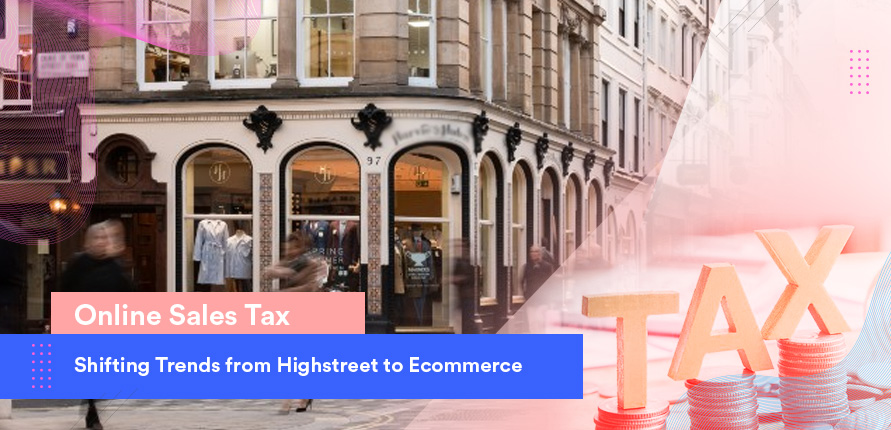
2% Ecommerce Taxes
Throughout the pandemic a whopping number of high street shop owners turned their faces toward ecommerce and online retail. The trend has come with its worries, would I pay tax if I am doing ecommerce business?
Most of you are familiar with sales tax, which is an additional percentage that retailers collect from their consumers/buyers. If you own a store where sales taxes are collected, you must apply the government and local sales taxes to the overall bill of the consumer, collect it, and return it to the local tax authority. However, when you market your goods online, things aren`t this straightforward regarding the transactions between you and the local authorities. After all, you might think of "what local authority when selling your products/ service online?"
If you are an online vendor, unsure if you need to pay sales tax, first check to see your local government policies.
UK high streets struggle, an online sales tax seeks to ‘shift the balance.'
The UK is planning a 2% internet sales tax on online e-commerce to raise £2 billion. This will be charged by the seller in addition to the regular VAT fee of 20% imposed on the buyer. This levy helps to level the playing field for traditional high-street retailers who face higher physical costs and Business Rates.
In response to the increasing trend, the Treasury is considering alternatives, as physical stores encounter the dual risk of retail internet and a Covid pandemic. According to online retail think-tanks, the Treasury was considering changes to “shift the balance” between shopping online and in retail stores, despite government worries about the effect on cities as more businesses close their doors for the last time. As many as 17,500 high street chain closed their doors for good as increasingly frequent lockdowns and rapid surge in internet shopping had devastating effects on the retail market, threatening to permanently change the environment of towns and cities.
Voices risen against the new tax regulations

The 2% e-commerce seller tax would target B2C sales to UK consumers made in direct competition to sales by physical retailers. Ministers claim that an online sales tax, which would include a new fee on internet purchases, could help prevent the high street from collapsing. Business organisations including the British Retail Consortium have spoken out against the move, claiming that it would damage high-street stores with internet operations and raise prices for customers at a time when the British economy is suffering from extreme weakness.
Retail Giants Support the Online Sales Tax
However, several major retailers, including Tesco, have previously supported the implementation of an internet sales tax to correct the balance. The proposed tax only applies to social media companies like Facebook, search engines like Google, and online marketplaces like Amazon.
The government's digital services tax went into effect in April 2020, intending to make tech giants pay their fair share of taxes, but it excludes Netflix. The firm has paid minimal taxes in the UK even though it has around 12m users. HM Revenue & Customs is scrutinizing the firm's UK operations. Netflix has declared that it will report billions of pounds of revenue from European customers to their respective local tax authorities. Netflix is the first in a line of digital companies to reform their processes to ensure that more revenue is declared to local tax authorities.
Changing Consumer Trends in Hospitality in 2021
2021 seems to be the year of rapid development for online-only virtual distribution brands, which provide a quick and cost-effective way for traditional restaurant and pub operators to enter the delivery sales market. Prior to the coronavirus outbreak, the delivery sector was still booming. The market size of foodservice distribution rose from £8.1 billion to £8.5 billion between 2018 and 2019, according to Statista's food delivery and takeaway sector study. According to the research agency CGA, 60% of 18–24-year-olds have increased their use of food delivery services because of the pandemic, and 26% expect to increase their use of delivery services as a result of the pandemic.
Chancellor is on the move against Online Delivery Giants
The chancellor, Rishi Sunak, is supportive of such a move, but will most likely wait until the autumn of this year to conduct a strike on internet companies such as Amazon, Asos, and Ocado, rather than using it in the current budget. The online retail tax would be similar to the UK Digital Services Tax, a 2% levy on a turnover by global digital media groups providing advertising and data services.
A delivery tax may also be implemented to reduce traffic and pollution. The seller or delivery agent can charge for this. Like plastic bag taxes, this seeks to nudge customer behaviour towards more eco-sustainable behaviours such as minimising buy and returns or promoting more effective bundling of several orders.
Online Sales Tax Consultation Effects Property Industry

The consultation also considers reform of the Business Rates system, which has the potential to skew the competition in favour of online retailers. As an alternative, the Treasury proposes a capital gains levy, which will shift the tax liability from the tenant to the landlord.
The idea was to see thriving high streets, which is why the treasury has spent billions of pounds funding shops after the pandemic and is now supporting town centers because of the improvements brought by online shopping. With several stores having to close temporarily after the lockdown and shoppers staying away from high streets after the pandemic, official estimates show that the amount invested online rose by 46 % relative to the previous year. Online spending currently accounts for about 30% of all retail sales in the United Kingdom, up from approximately 20% a year earlier. In a further indication of the pattern, Amazon's UK revenue increased by 51% last year to $26.5 billion (£19.4 billion), as customers remaining at home through the lockdown switched to the retailing giant to purchase products scarce on the closed high streets.
Even on big marketplaces, the majority of UK transactions are made by mid or small retailers. Since thousands of sellers fall below the UK VAT registration threshold (£85K), enforcing any new tax will be difficult. Analysts conclude that a permanent increase in internet spending may be a long-term result of the pandemic. While the additional online sales tax is meant to level the field playing field, it still remains unclear whether the additional cost in the case of online sales will be borne by the companies or the end consumers. In the past, we have seen companies like Google immediately pass on the burden of 2% digital services tax to the customers, by way of a fee hike.












